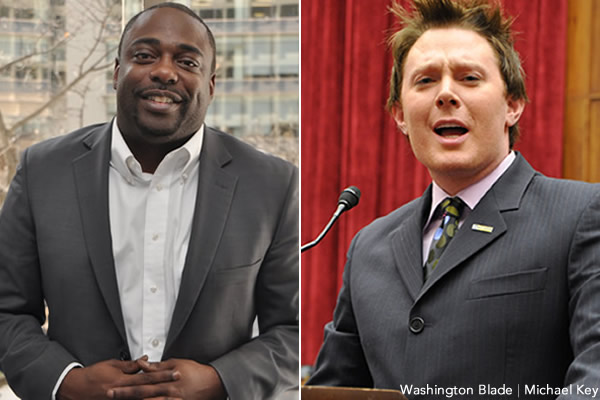News
Big day for gay candidates in N.C.
Brandon, Aiken face uphill fight in bids for Congress


Marcus Brandon (left) and Clay Aiken are facing primaries today in North Carolina. (Washington Blade photos by Michael Key)
The outcome of today’s primary in North Carolina will determine whether gay candidates in the state will carry the Democratic banner heading into the congressional mid-term elections.
Two openly gay candidates are on the ballot in congressional races: State Rep. K. Marcus Brandon, who’s running to represent North Carolina’s 12th congressional district, and Clay Aiken, who’s seeking the seat for the state’s 2nd congressional district.
Aiken has faced significant challenges during his congressional bid. Despite the buzz over his celebrity status and distinction as a runner up on “American Idol,” Aiken has raised only $287,000. Meanwhile, his opponent in the primary, former North Carolina commerce secretary Keith Crisco, has raised $680,000.
Crisco has also been hitting Aiken with negative ads. Aiken has touted his work on behalf of children with disabilities, but one Crisco ad with the slogan “No Show Clay” questions his commitment.
The ad asserts that after Aiken was appointed in 2006 to the Presidential Committee for People with Intellectual Disabilities, the singer never showed up to meet with the group. Aiken, who notes his membership on the panel on his campaign website, reportedly said in response he showed up for the first meeting of the group.
Whoever wins the election in the Democratic primary will go on to face Republican incumbent Renee Ellmers (R-N.C.), who’s considered the favorite in the Republican district.
Also facing a challenging primary is Brandon, who if elected could become the first openly gay black member of Congress. He’s in a crowded primary among five Democratic candidates seeking to replace former Rep. Melvin Watt, who left Congress to head the Federal Housing Finance Agency.
State Rep. Alma Adams is considered the front-runner in the race. She’s raised $386,000 compared to the $254,000 that Brandon has raised, although he’s in second in terms of funds raised among the candidates in the crowded field.
The 12th congressional district is heavily Democratic, so whoever wins the Democratic primary will more than likely have the seat secured. But if no candidate secures 40 percent of the vote, which is likely, a run-off election for the top two vote-getters will take place on July 15.
The Gay & Lesbian Victory Fund has endorsed Brandon, but Aiken received no endorsement from the group.
Another race of note is the primary for the Republican nomination to run for U.S. Senate in North Carolina. House Speaker Thom Tillis, obstetrician Greg Brannon, and Baptist pastor Mark Harris are vying for the Republican nomination to challenge Sen. Kay Hagan (D-N.C), who’s considered among the most vulnerable Democrats in the mid-term election.
All the Republican candidates have expressed opposition to same-sex marriage. Hagan, who spoke out against North Carolina’s constitutional ban on same-sex marriage, endorsed marriage equality last year.
As QNotes’ Matt Comer reports, gay representation in the state legislature is also at stake in the primary. Openly gay candidate Ty Turner is among a field of five candidates in the primary State Senate District 40, which is near Charlotte. Gay state candidate Derek Kiszely is running Kim Hanchette in House District 49.
But even if he wins the primary, Kiszely is unlikely to win the general election because he’s running in a Republican district. That means if Turner loses in the primary, the state General Assembly will likely have no gay representation for the first time in 10 years.
Polls opened today at 6:30 a.m. and will close at 7:30 p.m.

Texas state Rep. James Talarico won a hard-fought primary Tuesday to become the state’s Democratic nominee for U.S. Senate, defeating U.S. Rep. Jasmine Crockett in one of the year’s most closely watched and competitive Democratic contests.
Talarico, a Presbyterian seminarian and three-term lawmaker from Round Rock, was declared the winner by the Associated Press early Wednesday morning after a closely tracked vote count that drew national attention.
“Tonight, the people of our state gave this country a little bit of hope,” Talarico told the AP. “And a little bit of hope is a dangerous thing.”
With 52.8% of the vote to Crockett’s 45.9%, Talarico secured the nomination outright, avoiding a runoff and capping months of sharp contrasts between the two candidates over strategy, messaging, and how best to compete statewide in Texas. Democrats hope the competitive primary — and the relatively narrow margin — signals growing momentum in a state that has not elected a Democrat to the U.S. Senate since 1988.
Talarico has long expressed support for the LGBTQ community, a position he highlights prominently on his campaign website. Under the “Issues” section, he directly addresses assumptions that might arise from his faith and background as a seminarian in a deeply conservative state.
“My faith in Jesus leads me to reject Christian Nationalism and commit myself to the project of democracy,” his website reads. “Because that’s the promise of America: a democracy where every person and every family — regardless of religion, race, gender, sexual orientation, or any other difference between us — can truly be free and live up to their full potential.”
Crockett struck a conciliatory tone following her defeat, emphasizing party unity ahead of November.
“This morning I called James and congratulated him on becoming the Senate nominee,” Crockett told Politico. “Texas is primed to turn blue and we must remain united because this is bigger than any one person. This is about the future of all 30 million Texans and getting America back on track.”
Talarico also drew national attention earlier in the race when “Late Show” host Stephen Colbert said he was initially unable to air an interview with the state legislator due to potential FCC concerns involving CBS. The episode sparked a broader political debate.
Brendan Carr, chair of the Federal Communications Commission, appointed by President Donald Trump, told reporters the controversy was a “hoax,” though he also acknowledged Talarico’s ability to harness the moment to build support as an underdog candidate. The interview was later released online and garnered millions of views, boosting Talarico’s national profile.
In November, Talarico will face the winner of the Republican primary between incumbent Sen. John Cornyn and Texas Attorney General Ken Paxton, who have been locked in a bruising GOP contest. Rep. Wesley Hunt was also in the Republican primary field. The GOP race is expected to head to a May runoff.
In a joint statement, Senate Minority Leader Chuck Schumer and Democratic Senatorial Campaign Committee Chair Kirsten Gillibrand praised Talarico’s victory and framed him as a candidate capable of broad appeal.
“As an eighth-generation Texan, former middle school teacher, and Presbyterian seminarian, James will be a fighter for Texans from all walks of life and of all political stripes,” they said. “In November, Texans will elect a champion for working people: James Talarico.”
Maryland
Md. Commission on LGBTQIA+ Affairs released updated student recommendations
LGBTQ students report higher rates of bullying, suicide

The Maryland Commission on LGBTQIA+ Affairs has released updated recommendations on how the state’s schools can support LGBTQ students.
The updated 16-page document outlines eight “actionable recommendations” for Maryland schools, supplemented with data and links to additional resources. The recommendations are:
- Developing and passing a uniform statewide and comprehensive policy aimed at protecting “transgender, nonbinary, and gender expansive students” against discrimination. The recommendation lists minimum requirements for the policy to address: name, pronoun usage, and restroom access.
- Requiring all educators to receive training about the specific needs of LGBTQ students, by trained facilitators. The training’s “core competencies” include instruction on terminology, data, and support for students.
- Implementing LGBTQ-inclusive curricula and preventing book bans. The report highlights a “comprehensive sexual education curriculum” as specifically important in the overall education curriculum. It also states the curriculum will “provide all students with life-saving information about how to protect themselves and others in sexual and romantic situations.”
- Establishing Gender Sexuality Alliances “at all schools and in all grade levels.” This recommendation includes measures on how to adequately establish effective GSAs, such as campaign advertising, and official state resources that outline how to establish and maintain a GSA.
- Providing resources to students’ family members and supporters. This recommendation proposes partnering with local education agencies to provide “culturally responsive, LGBTQIA+ affirming family engagement initiatives.”
- Collecting statewide data on LGBTQ youth. The data on Maryland’s LGBTQ youth population is sparse and non-exhaustive, and this recommendation seeks to collect information to inform policy and programming across the state for LGBTQ youth.
- Hiring a full-time team at the Maryland Department of Education that focuses on LGBTQ student achievement. These employees would have specific duties that include “advising on local and state, and federal policy” as well as developing the LGBTQ curriculum, and organizing the data and family resources.
- Promoting and ensuring awareness of the 2024 guidelines to support LGBTQ students.
The commission has 21 members, with elections every year, and open volunteer positions. It was created in 2021 and amended in 2023 to add more members.
The Governor’s Office of Communication says the commission’s goal is “to serve LGBTQIA+ Marylanders by galvanizing community voices, researching and addressing challenges, and advocating for policies to advance equity and inclusion.”
The commission is tasked with coming up with yearly recommendations. This year’s aim “to ensure that every child can learn in a safe, inclusive, and supportive environment.”
The Human Rights Campaign’s most recent report on LGBTQ youth revealed that 46.1 percent of LGBTQ youth felt unsafe in some school settings. Those numbers are higher for transgender students, with 54.9 percent of them saying they feel unsafe in school.
Maryland’s High School Youth Risk Behavior Survey reveals a disparity in mental health issues and concerns among students who identify as LGBTQ, compared to those who are heterosexual. LGBTQ students report higher rates of bullying, feelings of hopelessness, and suicidal thoughts. Nearly 36 percent of LGBTQ students report they have a suicide plan, and 26.7 percent of respondents say they have attempted to die by suicide.
The commission’s recommendations seek to combat the mental health crisis among the state’s LGBTQ students. They are also a call for local and state governments to work towards implementing them.
Virginia
Va. lawmakers consider partial restoration of Ryan White funds
State Department of Health in 2025 cut $20 million from Part B program

The Virginia General Assembly is considering the partial restoration of HIV funding that the state’s Department of Health cut last year.
The Department of Health in 2025 cut $20 million — or 67 percent of total funding — from the Ryan White Part B program.
The funding cuts started with the Trump-Vance administration passing budget cuts to federal HIV screening and protection programs. Rebate issues between the Virginia Department of Health and the company that provides HIV medications began.
Advocates say the funding cuts have disproportionately impacted lower-income people.
The Ryan White HIV/AIDS Program, a federal program started in 1990, provides medical services, public education, and essential services. Part B offers 21 services, seven of which remained funded after the budget cuts.
Equality Virginia notes “in 2025, a 67 percent reduction severely destabilized HIV services across the commonwealth.”
Virginia lawmakers have approved two bills — House Bill 30 and Senate Bill 30 — that would partially restore the funding. The Ryan White cuts remain a concern among community members.
Both chambers of the General Assembly must review their proposed changes before lawmakers can adopt the bills.
“While these amendments aren’t a full restoration of what community-based organizations lost, this marks a critical step toward stabilizing care for thousands of Virginians living with HIV,” said Equality Virginia Executive Director Narissa Rahaman. “Equality Virginia plans to continue their contact with lawmakers and delegates through the conference and up until the passing of the budget.”
“We appreciate lawmakers from both sides of the aisle who recognized the urgency of this moment and will work to ensure funding remains in the final version signed by the governor,” added Rahaman.



















